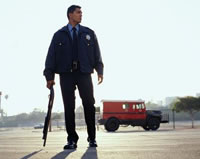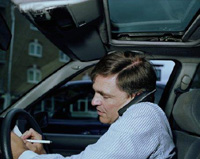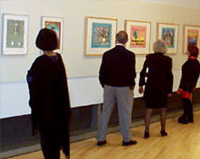 Guards,
who are also called security officers, patrol and inspect
property to protect against fire, theft, vandalism,
terrorism, and illegal activity. These workers protect
their employer's investment, enforce laws on the property,
and deter criminal activity or other problems. They
use radio and telephone communications to call for assistance
from police, fire, or emergency medical services as
the situation dictates. Security guards write comprehensive
reports outlining their observations and activities
during their assigned shift. They may also interview
witnesses or victims, prepare case reports, and testify
in court.
 Although
all security guards perform many of the same duties,
specific duties vary based on whether the guard works
in a "static" security position or on a mobile
patrol. Guards assigned to static security positions
usually serve the client at one location for a specific
length of time. These guards must become closely acquainted
with the property and people associated with it and
often monitor alarms and closed-circuit TV cameras.
In contrast, guards assigned to mobile patrol duty drive
or walk from location to location and conduct security
checks within an assigned geographical zone. They may
detain or arrest criminal violators, answer service
calls concerning criminal activity or problems, and
issue traffic violation warnings.
Specific job responsibilities also
vary with the size, type, and location of the employer.
In department stores, guards protect people, records,
merchandise, money, and equipment. They often work with
undercover store detectives to prevent theft by customers
or store employees and help in the apprehension of shoplifting
suspects prior to arrival by police. Some shopping centers
and theaters have officers mounted on horses or bicycles
who patrol their parking lots to deter car theft and
robberies. In office buildings, banks, and hospitals,
guards maintain order and protect the institutions'
property, staff, and customers. At air, sea, and rail
terminals and other transportation facilities, guards
protect people, freight, property, and equipment. They
may screen passengers and visitors for weapons and explosives
using metal detectors and high-tech equipment, ensure
nothing is stolen while being loaded or unloaded, and
watch for fires and criminals.
 Guards
who work in public buildings such as museums or art
galleries protect paintings and exhibits by inspecting
people and packages entering and leaving the building.
In factories, laboratories, government buildings, data
processing centers, and military bases, security officers
protect information, products, computer codes, and defense
secrets and check the credentials of people and vehicles
entering and leaving the premises. Guards working at
universities, parks, and sports stadiums perform crowd
control, supervise parking and seating, and direct traffic.
Security guards stationed at the entrance to bars and
places of adult entertainment, such as nightclubs, prevent
access by minors, collect cover charges at the door,
maintain order among customers, and protect property
and patrons.
Armored Vehicles
 Armored
car guards protect money and valuables during transit.
In addition, they protect individuals responsible
for making commercial bank deposits from theft or
bodily injury. When the armored car arrives at the
door of a business, an armed guard enters, signs for
the money, and returns to the truck with the valuables
in hand. Carrying money between the truck and the
business can be extremely hazardous for guards. Because
of this risk, armored car guards usually wear bullet-proof
vests. Armored
car guards protect money and valuables during transit.
In addition, they protect individuals responsible
for making commercial bank deposits from theft or
bodily injury. When the armored car arrives at the
door of a business, an armed guard enters, signs for
the money, and returns to the truck with the valuables
in hand. Carrying money between the truck and the
business can be extremely hazardous for guards. Because
of this risk, armored car guards usually wear bullet-proof
vests.
All security officers must show good judgment and
common sense, follow directions and directives from
supervisors, accurately testify in court, and follow
company policy and guidelines. Guards should have
a professional appearance and attitude and be able
to interact with the public. They also must be able
to take charge and direct others in emergencies or
other dangerous incidents. In a large organization,
the security manager is often in charge of a trained
guard force divided into shifts; whereas in a small
organization, a single worker may be responsible for
all security.
Gaming surveillance
 Gaming
surveillance officers and gaming investigators act
as security agents for casino managers and patrons.
They observe casino operations for irregular activities,
such as cheating or theft, by either employees or
patrons. To do this, surveillance officers and investigators
often monitor activities from a catwalk over one-way
mirrors located above the casino floor. Many casinos
use audio and video equipment, allowing surveillance
officers and investigators to observe these same areas
via monitors. Gaming
surveillance officers and gaming investigators act
as security agents for casino managers and patrons.
They observe casino operations for irregular activities,
such as cheating or theft, by either employees or
patrons. To do this, surveillance officers and investigators
often monitor activities from a catwalk over one-way
mirrors located above the casino floor. Many casinos
use audio and video equipment, allowing surveillance
officers and investigators to observe these same areas
via monitors.
 Recordings
are kept as a record and are sometimes used as evidence
against alleged criminals in police investigations.
Most security guards and gaming surveillance officers
spend considerable time on their feet, either assigned
to a specific post or patrolling buildings and grounds.
Guards may be stationed at a guard desk inside a building
to monitor electronic security and surveillance devices
or to check the credentials of persons entering or
leaving the premises. They also may be stationed at
a guardhouse outside the entrance to a gated facility
or community and use a portable radio or cellular
telephone that allows them to be in constant contact
with a central station. The work usually is routine,
but guards must be constantly alert for threats to
themselves and the property they are protecting. Guards
who work during the day may have a great deal of contact
with other employees and members of the public. Gaming
surveillance often takes place behind a bank of monitors
controlling several cameras in a casino, which can
cause eyestrain. Recordings
are kept as a record and are sometimes used as evidence
against alleged criminals in police investigations.
Most security guards and gaming surveillance officers
spend considerable time on their feet, either assigned
to a specific post or patrolling buildings and grounds.
Guards may be stationed at a guard desk inside a building
to monitor electronic security and surveillance devices
or to check the credentials of persons entering or
leaving the premises. They also may be stationed at
a guardhouse outside the entrance to a gated facility
or community and use a portable radio or cellular
telephone that allows them to be in constant contact
with a central station. The work usually is routine,
but guards must be constantly alert for threats to
themselves and the property they are protecting. Guards
who work during the day may have a great deal of contact
with other employees and members of the public. Gaming
surveillance often takes place behind a bank of monitors
controlling several cameras in a casino, which can
cause eyestrain.
|

